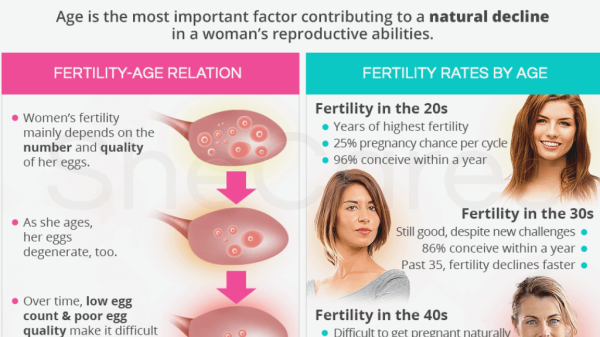
Introduction:


Understanding fertility at 35
The perks of being an older parent
Preparation for pregnancy at 35
Health examination and consultation
Understanding fertility changes
Nutrition and food
Essential nutrients for pregnancy
Foods to Avoid
physical health
Recommended exercises
Weight management
Good mental state
Stress management techniques
The role of mental health in fertility
Medical considerations
Fertility treatments and options
Genetic screening and counseling
Lifestyle adjustments
Balancing work and fertility efforts
Reducing harmful habits
Understanding risk
Common risks and how to mitigate them
When to seek medical advice
Community and support
Finding a support network
Role of partner and family
Financial planning
Fertility treatment costs
Maternity leave plan
Alternative routes to parenting
adoption
Surrogacy
success story
Inspirational stories of late pregnancy
Expert advice
Tips from fertility experts
Conclusion
Getting Pregnant at 35: Tips for a Healthy and Successful Journey
Introduction
Getting pregnant at 35 can be an empowering and rewarding experience. With the right knowledge and preparation, many women at this age successfully embark on the journey of motherhood. Understanding how fertility changes over time and the benefits of being an older parent is important.
Preparation for pregnancy at 35
Before trying to conceive, a health checkup is very important. Women should consult with their health care provider to discuss fertility and any underlying health concerns. It is also important to understand how fertility changes with age.
Nutrition and food
A balanced diet rich in essential nutrients is key to a healthy pregnancy. Women should focus on folic acid, iron, calcium and omega-3 fatty acids. Avoiding harmful foods and substances is equally important.
physical health
Regular exercise helps maintain a healthy weight and reduces pregnancy-related complications. It is important to choose safe exercises during pregnancy.
Good mental state
Stress management is vital for fertility. Techniques such as yoga, meditation, and counseling can be helpful. Mental health plays an important role in the pregnancy journey.
Medical considerations
For those facing fertility challenges, various treatments and options are available, including IVF. Genetic screening and counseling can provide valuable insight for expectant mothers over age 35.
Lifestyle adjustments
Balancing work and fertility efforts can be challenging but necessary. Reducing harmful habits like smoking and excessive caffeine is crucial.
Understanding risk
It is important to be aware of the risks associated with subsequent pregnancies. Women should understand these risks and know when to seek medical advice.
Community and support
A strong support network including partners, family and friends is invaluable. Support groups can also offer encouragement and advice.
Financial planning
Understanding the cost of fertility treatments and planning for maternity leave are essential steps in pregnancy preparation.
Alternative routes to parenting
Options such as adoption and surrogacy are available for those who face challenges with natural conception.
success story
Inspirational stories of women who have successfully conceived after 35 can be inspiring and reassuring.
Expert advice
Tips from fertility experts can provide valuable guidance for women trying to conceive at age 35.
Conclusion
Getting pregnant at 35 is a unique journey that requires careful planning and preparation. With the right approach, many women successfully achieve their dream of motherhood at this age.
FAQs
Question 1: Is it safe to get pregnant at age 35?
A1: Yes, with proper healthcare and preparation, it is safe to get pregnant at age 35.
Question 2: How can I improve my chances of getting pregnant at age 35?
A2: Maintain a healthy lifestyle, seek regular medical advice and consider fertility treatment if necessary.
Question 3: Are there any specific risks associated with pregnancy at age 35?
A3: There are some increased risks, such as chromosomal abnormalities, but these can be managed with appropriate medical care.
Question 4: Can diet and lifestyle changes really affect fertility?
A4: Yes, a healthy diet and lifestyle can significantly improve fertility and the chances of a healthy pregnancy.
Question 5: Should I consider genetic counseling before getting pregnant at age 35?
A5: Genetic counseling can provide valuable insight and is worth considering for those planning to conceive at age 35.
When planning for pregnancy at 35, seeking advice from fertility specialists is invaluable. They can offer tailored guidance, considering individual health profiles and circumstances. Experts often emphasize the importance of early and regular prenatal care to monitor both the mother’s and baby’s health throughout the pregnancy.
Regular monitoring and testing become more critical as women age. This includes frequent ultrasounds, blood tests, and possibly non-invasive prenatal testing (NIPT) to check for chromosomal abnormalities. These tests help in early detection of any potential issues, allowing for timely interventions.
For some women over 35, natural conception may be challenging. In such cases, fertility treatments like in vitro fertilization (IVF) or intrauterine insemination (IUI) can be considered. It’s essential to discuss these options thoroughly with a fertility specialist to understand the processes, success rates, and any associated risks.